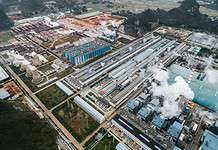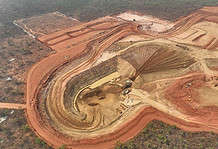INDUSTRIAL instability and violence in South Africa’s platinum mining industry continue to threaten the country’s economy, after 4000 mine workers engaged in a ‘sit-in strike’ at Anglo-American’s Thembelani mine.
As trade union representatives met with government officials to draft a framework for a sustainable platinum industry several thousand platinum workers went on strike, refusing to exit an underground mine owned by the world’s largest primary platinum producer, in protest of the suspension of four of its leaders from the Association of Mineworkers and Construction Union (AMCU).
The union leaders were allegedly suspended for presenting fraudulent membership applications to boost membership numbers.
The AMCU is central to a bitter union rivalry against the National Union of Mineworkers, as both unions struggle to gain the upper hand to control and represent miners’ interests within the South African platinum belt. The ongoing
conflict between the two major workers’ unions was the main ground for drafting the industrial unrest document.
Mining provides 10 per cent of South Africa’s economy and 365,000 jobs.
However, a series of strikes at platinum and other mines last year reduced the country’s gross domestic product by a substantial 0.5 per cent.
Last month, the world’s third-largest platinum producer Lomin was forced to cease production at 13 of its South African mine shafts after thousands of workers arrived at the company’s Marikana mine, but refused to go underground. This action occurred after the shooting of a NUM union representative.
Lonmin rose to international attention following miners’ strikes at its Marikana mine site in August 2012, where 36 striking Lonmin employees were shot dead, and another 78 were wounded by South African police officers.
In early May, an AMCU supporter allegedly committed suicide, hanging himself from a tree near where he saw police officers shoot dead striking mineworkers last August. The man was the seventh to have committed suicide since December in relation to the police action.
The government, labour groups and the mining industry entered into diplomatic counsel in June, to draft a framework for sustainable mining addressing the short-term economic situation, create jobs and to distribute wealth in the longer term.
The document drafting came at a crucial juncture for the country’s precious metal industry, as the violent industrial tendencies of the platinum belt in the northwest reach breaking point.
Party representatives have agreed to meet quarterly to discuss new issues, address factors behind workers’ conflicts and make executive decisions that promote peaceful labour relations.
Ongoing unrest in South African platinum belt
Advertisement








































